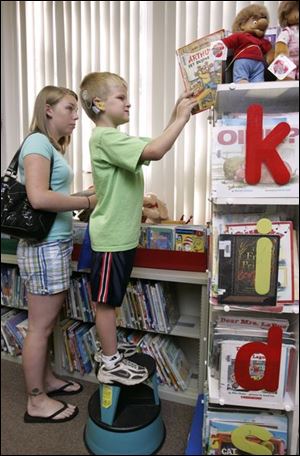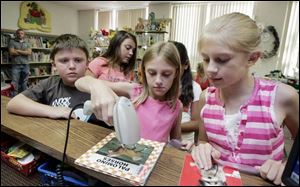
Springfield Local reading plan aims to clog 'brain drain'
7/2/2008
Addison Toth, 8, takes an accelerated reading test based on a book that she read during the elementary school's summer reading program. Addison will enter third grade in the fall.

Six-year-old Tyler Kelly selects a book during the summer Accelerated Reading Program at Dorr Elementary School.
Dorr Elementary School bustles every Tuesday morning, and children like Taylor Boulton are the reason why.
She's one of more than 60 students at the Springfield Local elementary participating in the summer Accelerated Reading Program.
The program, in its fifth year, was the brainchild of Dorr teachers, who volunteer their time each week during summer break. Their goal is to improve students' reading skills and prevent what in educational circles is known as the "summer brain drain" - the state of intellectual indolence children can settle into when they stop going to classes and doing assignments.
"If you look at the brain as a muscle, if you fail to use it, you lose it," Dorr Principal Ken Newbury said. "We know that it's extremely important to keep kids stimulated all summer. Students can lose 25 percent of their skill level and reading fluency."
Over five years, Dorr's reading performance index has increased from a state ranking of continuous improvement to effective, the principal said. With a score in the high 90s, the school is just below excellent, an improvement Mr. Newbury attributes in part to the summer reading program. The program costs the school district nothing.
A $10,000 donation from Savage and Associates Inc. pays for materials and such incentives as pizza parties. The school building would be open anyway for summer maintenance, district spokesman Kristina White said.

Addison Toth, 8, takes an accelerated reading test based on a book that she read during the elementary school's summer reading program. Addison will enter third grade in the fall.
Taylor, 7, who will be in the second grade this fall, comes in for an hour each week. She reads at a third-grade level and wants to improve her proficiency, said her mother, Julie Boulton, who accompanies the girl.
Last week one of the titles Taylor was taking home, Clip Clip, had personal relevance. It was a collection of three stories about cutting hair.
"She pulled it from the shelf because she just had her hair cut about five inches," her mother said.
Parents like Ms. Boulton who stay for the hour are a benefit, Mr. Newbury said. "They get invested too, and this improves the kids' performance," he explained.
The children take home two books a week. The summer program makes use of Star Reading, a computerized assessment tool that measures a child's reading comprehension and vocabulary.

Alexis Nowaczyk, center, scans a book that she is checking out. Looking on are Tyson Leavitt and Courtney Nowaczyk, Alexis' sister. Behind them are Miranda Leavitt and Kaitlin Unisko.
A detailed report is produced analyzing the child's reading strengths and weaknesses. Once the child's reading level is established, he or she is matched with books in that range.
When the children finish their books, they take a multiple-choice computer test to assess their comprehension.
They earn points for reading a book and have a cumulative score, Lyn Welly, a third-grade teacher said. When a certain score is achieved, they get awards.
"We want this to be fun," said Mr. Newbury. "We don't want it to be like having homework. We want it to be more like a summer camp for an hour each week."